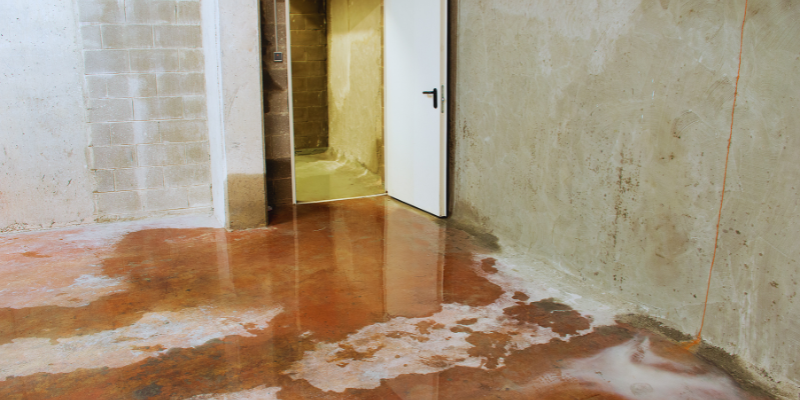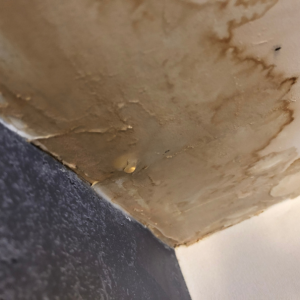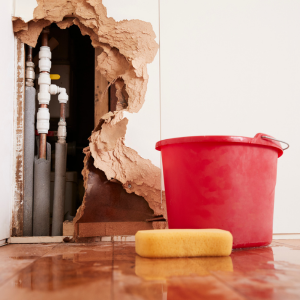
Understanding Water Damage: Common Causes and Solutions
When you’re ready to sell your Vancouver, WA home, it’s important to know how water damage can lower its value. In this part of the Pacific Northwest, it’s often caused by heavy rain, plumbing problems, and bad draining. People who own homes often have problems, such as roofs that leak because the shingles are worn out, gutters that get stuck and overflow, and basements that flood because they aren’t waterproofed properly. When you add in the area’s constant wetness, you have a mold and mildew mix.
Dealing with these types of issues often calls for a combination of solutions, replacing damaged pipes, installing sump pumps, sealing foundation cracks, and improving ventilation to keep humidity in check. Staying proactive with regular maintenance is just as important. Addressing small problems early can help you avoid much bigger (and costlier) ones later. If you’re planning to sell your home, making these repairs not only helps preserve your investment but also makes your property more attractive to buyers. Sell With Isaac is here to help, contact us today to get started.
How Climate Affects Property Sales and Water Damage in Washington State
Vancouver’s rainy climate isn’t just a nuisance it can have a real impact on property sales. The frequent downpours and high humidity typical of Washington State can take a toll on homes, especially those with existing water damage. Moisture seeps in, mold starts to grow, and over time, structural and foundation issues can pop up. These aren’t just cosmetic problems; they’re red flags for buyers.
When you’re selling your home, it’s important to show how you’ve fixed or protected it. Improvements like better drainage, new protection systems, or even a new roof can make buyers feel a lot better. Putting these efforts on display makes your home look well-kept and durable, which is what all buyers want in the wet Pacific Northwest housing market.
Insurance Implications and Coverage Options Related to Residential Water Damage
When you’re dealing with a water-damaged home, understanding your insurance coverage is critical especially if you’re planning to sell. Not all policies cover the same types of damage. Standard homeowners insurance might help with things like burst pipes or roof leaks, but flood damage usually requires a separate policy. It’s worth checking with your insurer to get a clear picture of what’s covered and what’s not.
Being open and honest is also very important when selling something. Potential buyers will trust you more if you tell them about any past water damage claims and show proof of fixes. If you filed a claim or had to make a lot of repairs, a thorough inspection report can help the buyer feel better. For peace of mind during the deal, you might also want to look into extra coverage or riders.
Key Factors Affecting Real Estate Value with Water Damage

Water damage can be a dealbreaker for some buyers, so understanding what affects your home’s value is important. Mold, structural problems, and even the smell of dampness can make a property feel risky. Buyers tend to be cautious when it comes to potential health issues or long-term maintenance problems. In a market like Vancouver, where rain is part of life, homes in flood-prone areas may carry an extra layer of concern.
If your property has experienced water damage, it’s essential to be upfront about what happened and what you’ve done to fix it. Highlighting professional remediation efforts—like mold removal or foundation repairs can help counter negative perceptions. A clean inspection report and documentation of improvements go a long way in showing buyers that the home is safe, solid, and ready to go.
Long-term Effects of Untreated Water Damage on Property Values
Leaving water damage unchecked doesn’t just create short-term headaches it can lead to serious, long-term problems that impact your home’s value. Over time, water can eat away at structural components, cause floors to warp, and encourage mold that spreads behind walls. These aren’t issues that go unnoticed by buyers or inspectors.
The longer these problems linger, the more expensive and invasive the repairs become. Not only does this hurt your asking price, but it can also shrink your pool of interested buyers. Even if the damage isn’t visible, a history of neglect can make a property feel like a risky investment. If you’re hoping to get top dollar, dealing with water issues head-on is the way to go.
Evaluating the Cost of Fixing Water Damage Versus Selling As-is
When your home has water damage, you’re faced with a big question: should you fix it up or sell it as-is? The answer depends on several factors, starting with how bad the damage is and what it would cost to repair. You’ll need quotes from contractors for everything from structural fixes to mold remediation.
On the flip side, selling as-is might attract investors or buyers looking for a project but you’ll likely have to settle for a lower price. It comes down to weighing the cost of repairs against what you’d gain from a higher sale price. Take into account the local market in Vancouver, too. If demand is high and inventory is low, you might get a decent offer even without making repairs. In the end, it’s about what makes the most financial sense for your situation and timeline.
Essential Repairs for Homes with Water Damage Before Selling
If you’re planning to sell a water-damaged home in Vancouver, WA, tackling essential repairs first can make a huge difference in both buyer interest and final sale price. Start with a thorough inspection to pinpoint damage, especially in areas like the basement, roof, and plumbing. Leaky roofs should be repaired, and gutters need to be in good working order to avoid future issues. Inside, damaged drywall and flooring should be replaced to help restore the home’s appearance. Mold removal is also important not just for health reasons but because it reassures buyers that the home is safe. Updating any outdated plumbing helps, too, since it signals the home is well cared for and won’t pose future headaches. Taking care of these basics can make your property far more appealing, even with a history of water damage.
Preparing Your Home Inspection Report When Dealing with Previous Flooding or Leaks
When your home has a history of water damage, preparing a detailed and honest home inspection report is key to moving forward with a sale in Vancouver. Bring in a certified inspector familiar with water-related issues they’ll look closely for signs of mold, structural concerns, or hidden damage. The report should include photos, notes on affected areas, and a summary of any repairs already done. Buyers will appreciate seeing this upfront, and it shows that you’re being proactive and transparent. In a market like Vancouver’s, where buyers are cautious about properties with past water problems, a solid inspection report can give them confidence and help keep your deal on track.
Legal Considerations When Selling a Home with Water Issues
If your Vancouver home has had water problems, you need to know what the law says about it before you put it on the market. Washington law says that all known flaws must be disclosed, including any water damage. Hiding problems from the past is not only wrong, but it could also get you in trouble with the law. Before you sell, getting a full check can help you keep track of how bad the damage is and what you’ve done to fix it. For big fixes, you might need a permit, so make sure everything is legal. You can get help from a local real estate lawyer to understand these rules and make sure you’re covered. Being honest can help you build trust with buyers right away and also protect you legally.
Understanding the Disclosure Requirements for Water-damaged Homes in Washington State
When selling a home in Washington, sellers are expected by law to tell buyers about any known water damage. This includes Vancouver homes. This means being honest about leaks, flooding, mold, or fixes to the house that had to be done because of water problems in the past. People who are buying something have the right to know what they’re getting into. Full disclosures can keep you out of problems with the law in the future. When you fill out the seller disclosure form, make sure you include all the important details about any damage that has already been done and what was done to fix it. Providing full disclosure not only ensures the deal stays legal, it also helps build trust with potential buyers who may be hesitant to purchase a home with a history of damage. At the same time, if you’re looking for a quicker option, we buy houses in Washington, including those with water damage or other issues.
Pricing Strategies for Homes with Significant Water Damage Issues
Setting the right price is essential when selling a home with water damage in Vancouver. Get quotes from professionals to get an idea of how much the repairs will cost. This will help you set a fair asking price. A little less than similar homes that haven’t been damaged can often bring in buyers looking for a good deal or a business chance. You can also help explain the price by listing any repairs you’ve already done. You could also offer repair credits or other benefits to make the deal more appealing. A real estate professional who knows the Vancouver market well can be a great help in this case. They can help you figure out the best way to price your home.
Negotiation Tips for Sellers Facing Potential Buyers’ Concerns Over Water Damage
When buyers express concerns about water damage, your ability to negotiate can make or break the deal. The key is transparency—be upfront about what happened, what’s been fixed, and provide proof, like inspection reports or contractor receipts. Showing buyers that preventative steps have been taken, such as installing a sump pump or improving drainage, can help ease their worries. Be prepared to offer concessions like repair credits, home warranties, or even covering some closing costs to help the deal along. Keeping the conversation open, honest, and solution-focused can help you come across as a seller who’s both responsible and reasonable.
Staging Tips for Making a House with Past Water Damage More Appealing
Good staging can make a big difference when selling a home with a history of water damage. Start with a deep clean and fresh coat of paint in neutral tones to give the home a clean, updated feel. Lighting is another easy fix use well-placed fixtures to brighten up the space and make rooms feel inviting. If flooring was damaged, replacing it or refinishing hardwood can dramatically boost the home’s appeal. Try using decor that suggests durability like glass, metal, or water-resistant finishes and bring in a few plants to freshen the air and create a cozy, lived-in vibe. Even small details like a subtle, fresh scent can go a long way in helping buyers focus on the home’s potential rather than its past issues.
Strategies for Marketing a Water-damaged Property in Vancouver, WA
Marketing a home with water damage takes a thoughtful approach, especially in a competitive market like Vancouver. Be upfront about the damage, but don’t let it define your listing focus on location perks, lot size, or features that still make the home a good buy. Use high-quality photos and honest descriptions to tell a balanced story, showing both the home’s current condition and its potential. Target your listing to investors, flippers, or DIY enthusiasts who are used to dealing with fixer-uppers. Pairing the listing with a thorough inspection report and repair estimates can also help buyers see the opportunity clearly. A local agent who understands the market dynamics can help you reach the right audience with the right message.

The Impact of Location on Selling Water-damaged Houses in Vancouver, WA
In Vancouver, where a home is located can sometimes matter more than its current condition. If your property is in a desirable neighborhood, near good schools, or close to parks and amenities, buyers may be more willing to overlook water damage. Proximity to transportation or areas undergoing development can also increase a home’s appeal. Even if repairs are needed, the value of the land and location can give buyers long-term confidence in their investment. Highlighting these strengths in your listing and marketing can help shift the focus from the damage to the home’s potential, especially in sought-after parts of Vancouver.
Finding Qualified Buyers Interested in Purchasing Damaged Properties
When selling a damaged property, your best bet is often to find buyers who specialize in this type of purchase. In Vancouver, that could mean targeting real estate investors, flippers, or contractors who are used to taking on renovation projects. You can connect with these buyers through local investor groups, real estate meetups, or by listing the home on websites that focus on fixer-uppers. Make sure to present the property’s potential clearly, including possible return on investment or value after repairs. An agent who knows how to work with this type of buyer can be a major asset in finding the right fit and getting a deal done quickly.
Financing Options Available to Buyers Considering Damaged Homes
Many traditional lenders are cautious about financing homes with significant damage, but there are still options out there for buyers in Vancouver. FHA 203(k) loans and Fannie Mae HomeStyle Renovation loans are designed specifically for homes that need work, allowing buyers to bundle the purchase and repair costs into one loan. Hard money lenders are another route, especially for investors or buyers planning a quick flip, though these come with higher interest rates. As a seller, being familiar with these financing options and highlighting them in your listing—can make your property more accessible and appealing to serious buyers who are ready to tackle a renovation.
Can You Sell a House with Water Damage?
Yes, you can absolutely sell a house with water damage in Vancouver it just requires the right strategy. Honesty is key; disclose everything upfront and back it up with an inspection or repair quotes so buyers know what to expect. If you’re able to make some repairs before listing, that can help improve the home’s appeal and raise your asking price. But even if repairs aren’t possible, pricing the home fairly and marketing it to the right audience like investors or flippers can still result in a successful sale. A local real estate professional familiar with these types of properties can help you position your home correctly and avoid common pitfalls.
Do You Have to Disclose Water Damage When Selling a House?
In Washington, sellers are legally required to disclose any known water damage, and that applies to homes in Vancouver as well. This includes both past and present issues, whether it’s a leaky roof that was repaired or a flooded basement that’s been cleaned up. Full disclosure not only protects you from legal issues but also builds trust with buyers. Be as detailed as possible, and provide documentation when you can this shows buyers that you’re being upfront and gives them a clearer picture of what they’re buying. In the long run, honest disclosures can lead to smoother negotiations and fewer surprises for everyone involved.

What Is the Average Payout for Water Damage Claims?
Insurance payouts for water damage can vary widely, but on average, homeowners can expect somewhere between $2,000 and $10,000 for moderate claims. In more severe cases especially those involving structural issues or mold remediation payouts can exceed $20,000. The exact amount depends on the policy details, the type of damage, and how well it’s documented. If you’re planning to sell your home in Vancouver after making an insurance claim, keeping clear records of all repairs and claim paperwork can help show buyers that the issue was professionally addressed. That kind of documentation can also make your home more appealing despite its history.
Are the Sellers of a House Liable for Repairs After the Closing?
If you’re looking to sell your house fast in Vancouver, it’s crucial to understand your responsibilities as a seller especially when it comes to water damage. In most cases, once the sale is finalized, you’re no longer on the hook for repairs unless you knowingly hid or failed to disclose a problem. That’s why transparency is key. Being upfront about any past or present water damage, and documenting it clearly in a disclosure form, can help you avoid legal trouble later on. A professional inspection report can also provide added protection. If a buyer finds hidden damage after closing and it turns out you knew about it, you could be held liable. When in doubt, speak with a real estate attorney to ensure you’re meeting your legal obligations and protecting yourself as you work to sell your home quickly.
| FLOODS | FLOODED | REAL ESTATE COMPANY | INSURANCE COMPANIES | VANCOUVER WA | HOMEOWNER’S INSURANCE |
| HOMEOWNERS INSURANCE | HOME INSURANCE | MOLD PREVENTION | MESSAGE | HOME INSPECTORS | FORECLOSURE |
| FORECLOSURE SALE | CASH | HOMELIGHT | STORM | DEHUMIDIFY | |
| DEHUMIDIFIERS | DATA | HURRICANES | APPRAISAL | PRIVACY | NATURAL DISASTERS |
| HOME FURNISHINGS | FURNITURE | FLAT ROOF | FEMA | CATASTROPHES | DISASTER |
| DEBRIS | COMMUNICATIONS | DOMESTIC WATER | FAUCETS | SCOTTSDALE | SCOTTSDALE, AZ |
| PAINTING | LITIGATION | INSURANCE POLICIES | GROUNDWATER | RUGS | CARPETS |
| INSULATION | BLOG | CRAWLSPACE | ON THE MARKET | WATER DAMAGE FROM | WATER DAMAGE SELLING |
| HOME WITH WATER DAMAGE | WITH WATER DAMAGE SELLING | WATER DAMAGE SELLING A | WATER DAMAGE CAN BE | WITH WATER DAMAGE CAN |
Helpful Vancouver Blog Articles
- Sell Your Vancouver, WA, Home With Code Violations
- Tenant Damage To Property In Vancouver, WA
- How To Sell My House To A Developer In Vancouver, WA
- How To Sell A House With Termites In Vancouver, WA
- Capital Gains Tax After Selling A House In Vancouver, WA
- Selling A House With Title Issues In Vancouver, WA
- Squatters’ Rights In Vancouver, WA
- Sell Your House In Vancouver, WA, Using A Quitclaim Deed
- Who Is Paying Taxes When Selling A Home In Vancouver, WA
- Selling A Water-damaged House In Vancouver, WA
- Selling Your Inherited House In Vancouver, WA
- Selling A House With Asbestos In Vancouver, WA
- Home Equity For Selling Your House In Vancouver, WA
- Tips For Downsizing Your Home In Vancouver, WA
- Vancouver, WA Neighborhood Map
- Vancouver, WA Property Managers
- Understanding Vancouver, WA Property Tax Rate

